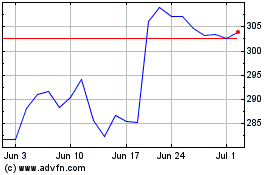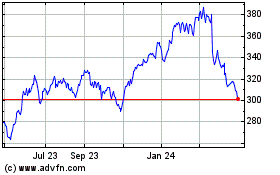2017 University Graduates Cling to Human Elements Despite Digital Fluency, According to Accenture
October 03 2017 - 7:45AM
Business Wire
Multi-country study is the first of its kind by
Accenture Strategy, which has benchmarked U.S. graduate perceptions
about the workforce since 2013
A new study by Accenture (NYSE:ACN) shows that three in four new
university graduates believe their education prepared them for
today’s digital workforce. Despite their digital native prowess,
only 19 percent of these new graduates prefer web communications
tools, while nearly four in ten (39 percent) favor face-to-face
interactions with colleagues.
This press release features multimedia. View
the full release here:
http://www.businesswire.com/news/home/20171003005053/en/
Percentage of graduates who prefer
working for a large company (Graphic: Business Wire)
Across all countries surveyed, most new graduates—those
graduating in 2017—have already taken digital or computer science
related courses when they begin their first job—ranging from 66
percent in the United Kingdom to 76 percent in Germany—bringing a
highly marketable digital mindset with them. Having this
experience, a majority of new graduates welcome artificial
intelligence (AI) and other advanced technologies, ranging from 56
percent in Spain to 70 percent in Italy, believing these new
technologies will enhance their work experience. Yet, new graduates
rated communication as well as problem solving skills (both 38
percent) as skills that would make them most attractive to
potential employers.
“It is not surprising that these digital natives are less
worried about their competency with emerging technologies,” said
Mary Lyons, Managing Director, Accenture Strategy, Talent &
Organization, Global Lead. “For them, working alongside technology
is less daunting than mastering the softer skills of communication,
problem solving and management. They have grown up in a connected
world where humans and machines have coexisted for as long as they
can remember.”
Recent Graduates Are Rethinking Their First Job
Choice
In addition to being prepared for a more digital workforce, the
study also found that as university graduates gain “real-world”
experience, their desire to work for large companies grows. For
instance, among recent graduates—those who graduated in 2015 or
2016—nearly one in three want to work for a large company. In
addition, the majority of recent grads (from 54 percent in the U.S.
to 72 percent in France) feel underemployed and are in a job they
feel doesn’t require their degree. These same graduates are nearly
three times more likely to stay with employers if their skills are
fully utilized.
“Large companies need to show new graduates that they are a
valuable first choice as a place to start their careers,” continued
Lyons. “Large companies are often
better positioned to provide the job security, learning
opportunities and career paths that new graduates desire.”
Tweet: Large companies the most popular employer for
recent grads according to @AccentureStrat https://accntu.re/2fo3mLK
.
New Entrants to the Workplace Take on a Future Forward
Mentality
New graduates are well prepared to enter the workforce. 82
percent of 2017 graduates will have completed an internship or
apprenticeship—in Germany, 93 percent—showing an appreciation for
the need to bring practical skills to the table from Day One as
they embark on their careers.
The future workforce is also flexible, as the vast majority of
new graduates are willing to relocate to another city or region for
the right job offer, ranging from 75 percent in the U.S. to 89
percent in Spain. Nearly half of new graduates (49 percent)
consider it acceptable to work on weekends or evenings, while 84
percent of new graduates would consider taking an internship after
graduation if it would help them land a job.
For more information and an interactive tool that shows the
breakdown of results by country, please visit:
www.accenture.com/us-en/insight-gen-z-rising-2017-edition.
Methodology
The Accenture Strategy 2017 Graduate Employment Study surveyed
6,016 students in France, Germany, Italy, Spain, the United Kingdom
and the United States graduating from university in 2017, and 6,004
students who graduated from university in 2015 and 2016, between
the ages of 18 and 24, to compare the perceptions of students
preparing to enter the job market with the experiences of recent
graduates already in the workforce. Generations in the workforce
were defined per the following birth years: Gen X: 1965–1979.
Millennials/Gen Y: 1980–1992. Gen Z: 1993–1999.
About Accenture
Accenture is a leading global professional services company,
providing a broad range of services and solutions in strategy,
consulting, digital, technology and operations. Combining unmatched
experience and specialized skills across more than 40 industries
and all business functions – underpinned by the world’s largest
delivery network – Accenture works at the intersection of business
and technology to help clients improve their performance and create
sustainable value for their stakeholders. With approximately
425,000 people serving clients in more than 120 countries,
Accenture drives innovation to improve the way the world works and
lives. Visit us at www.accenture.com.
Accenture Strategy operates at the intersection of business and
technology. We bring together our capabilities in business,
technology, operations and function strategy to help our clients
envision and execute industry-specific strategies that support
enterprise wide transformation. Our focus on issues related to
digital disruption, competitiveness, global operating models,
talent and leadership help drive both efficiencies and growth. For
more information, follow @AccentureStrat or visit
www.accenture.com/strategy.
View source
version on businesswire.com: http://www.businesswire.com/news/home/20171003005053/en/
Accenture StrategyTourang Nazari, +1
202-322-4640tourang.nazari@accenture.com
Accenture (NYSE:ACN)
Historical Stock Chart
From Mar 2024 to Apr 2024

Accenture (NYSE:ACN)
Historical Stock Chart
From Apr 2023 to Apr 2024
